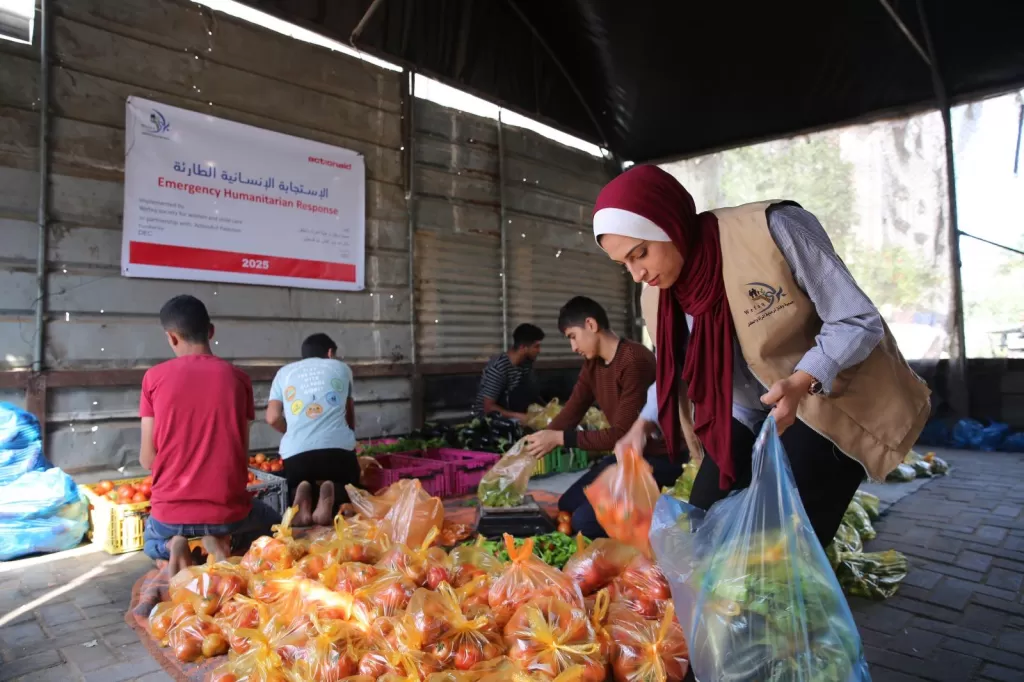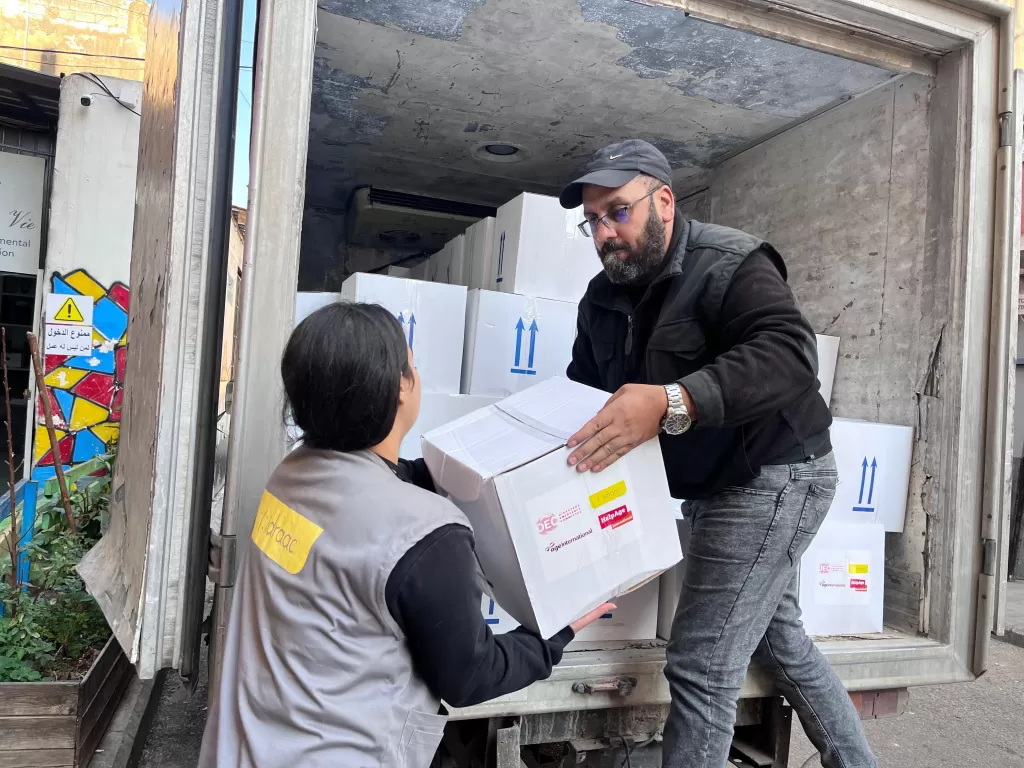
How and where DEC charities are responding in the Middle East
Conflict in the Middle East has devastated lives across the region, and millions have fled their homes in search of safety. People are in urgent need of food, water and medical care. DEC member charities and their local partners are working in Gaza, Lebanon, the West Bank and Syria now to provide life-saving aid.
How donations are being spent
Since the end of the temporary ceasefire in March 2025, the devastating humanitarian crisis in Gaza has deteriorated rapidly. Famine has now been confirmed in Gaza for the first time. The global hunger monitor, the IPC, says that famine is now taking place across Gaza City, where hundreds of thousands of people are also facing displacement again as the conflict escalates further.
DEC charities are working in whatever ways they still can to deliver aid and reach as many people as possible with food, clean water and medical care. However, with extremely limited amounts of aid allowed into Gaza, there is increasingly little they’re able to do to meet these overwhelming levels of need.
A surge in mass casualty incidents linked to new aid distribution sites has overwhelmed Gaza’s shattered healthcare system even further, pushing it past its limit.
DEC charities and their local partners are working separately to those distribution sites to deliver the support they are still able to, as safely as they can. DEC funds are supporting the last remaining field hospital in southern Gaza, through The British Red Cross and their local partners.
Cash assistance is providing a lifeline as local market prices spiral, enabling families to buy some food and essential items when they become available. With access to clean water for drinking and washing incredibly scarce, DEC charities and their local partners are working hard to continue delivering clean water, despite the challenges moving around Gaza.
Addressing severe shortages of food is their most urgent concern. Famine has been confirmed in Gaza for the first time. The global hunger monitor, the IPC, says that famine is now taking place across Gaza City and the surrounding areas where more than 500,000 people are currently living.
Although a few DEC charities and their local partners have been distributing hot meals and emergency nutrition support, without supplies entering Gaza many have been unable to provide the food that so many had been relying on.

DEC charity ActionAid's local partner in Gaza carry out a delivery of DEC funded fresh vegetables in food packages, in May 2025. (Image: Action Aid)
Examples of how DEC charities and their local partners have recently supported people in Gaza include:
- ActionAid has been working with its local partner organisation to deliver hot meals through community kitchens.
- Concern Worldwide and its local partner have been delivering clean water to displaced families. They have also funded a 'water filtration' unit to provide clean water and lifesaving dialysis treatment at Gaza's last operational children's hospital.
- The British Red Cross is supporting its local partner, the Palestine Red Crescent Society, to provide medical care to some of the many sick and injured.
- The International Rescue Committee is providing cash support so families can buy supplies available at local markets.
During the first 6 months of the DEC funded response, between October 2024 and April 2025:
- More than 440,000 ready to eat meals were distributed.
- Over 420,000 people benefitted from improved access to drinking water.
- Over 109,000 people gained improved access to healthcare, including the distribution of medicine and provision of primary healthcare services.
- More than 22,000 people were reached with cash assistance.
Much of this work was made possible by the increase in aid delivered during the ceasefire agreement earlier this year. Increased and safe access for humanitarian aid is urgently needed to save lives.
Lebanon
The ceasefire agreement in Lebanon at the end of last year meant some of the hundreds of thousands of people displaced by conflict could return to their communities and start to rebuild their lives. But months on, many still have no home to return to, and many more are cut off from basic services including water, electricity, and healthcare.
Ongoing violence continues to cause destruction and displacement. The psychological impact of the conflict and its devastating effect on lives and livelihoods is huge.
Public infrastructure has also been heavily damaged, leaving entire communities without access to essential healthcare services and clean water.
Levels of need in Lebanon remain very high. People require food, healthcare, and shelter.
Examples of how DEC charities are supporting people in Lebanon:
- Oxfam has been providing people displaced outside of collective sites with vital food parcels and items in northern Lebanon.
- International Rescue Committee has been providing multi-purpose cash for displaced people and returnees in Bekaa, to meet their urgent and basic needs.
- Action Against Hunger has supplied 15,000,000 litres of water across 800 facilities and has reached over 90,000 people with support since October 2023.
- Islamic Relief are providing food boxes to families in need in southern Lebanon. Many have returned to their communities but remain displaced.
The needs remain significant and long-term recovery will take time. DEC charities are supporting families now and in the weeks and months ahead.

IDRAAC, a local partner of DEC charity Age International and their local partner HelpAge International, carried out a DEC funded distribution to displaced families in Lebanon, in January 2025. (Image: IDRAAC)
The West Bank
Ongoing violence in the West Bank has led to widespread displacement and damage to homes, infrastructure and vital services. Three DEC charities and their local partners have been supporting families by distributing much-needed cash assistance for food items so people can use local markets, and providing clothing and shelter support.
Syria
Since hundreds of thousands of people fled across Lebanon’s border to Syria after conflict escalated in September 2024, DEC charities have been working to support people with their most urgent needs. With many families still displaced and living in difficult conditions in temporary shelter sites, a number of DEC charities are working with local partners in Syria to provide vital aid such as food baskets, water and sanitation support, hygiene supplies and warm blankets.
Are any funds from this appeal being spent in Israel?
The DEC is concerned about the situation in Israel, and the loss of life and suffering that so many there have faced for so many months. For the hostages and their families, many still desperately await news of their loved ones. Thousands of people have been displaced, and many are dealing with trauma after months of conflict.
DEC appeal responses always focus on those areas where significant humanitarian needs are not being met. For this reason, funds from the DEC Middle East Humanitarian Appeal are currently supporting people in Gaza, Lebanon, the West Bank and Syria, where millions of people urgently need food, water, shelter and medical care.
Find out more.